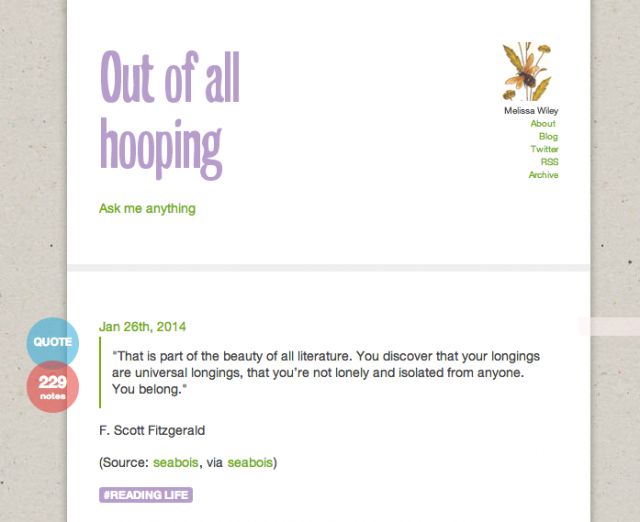Posts Tagged ‘book quotes’

What times are these
When to write a poem about love
Is almost a crime
Because it contains
So many silences
About so many horrors….
(His reworking of Bertolt Brecht’s “What times are these when to talk about trees is almost a crime because it implies silence about so many horrors?”)
***
Strive to change the world in such a way that there’s no further need to be a dissident.
***
Don’t let it be said of you that sluggish imagination drowned out the slush of your heart.
***
Don’t hew stones. Dip into the sea for poetry, every poem a live fish.
“Tell me some more about your valley,” she said to Moomintroll.
“It’s the most wonderful valley in the world,” he answered. “There are blue-trees with pears growing on them, and chatterfinches sing from morning till night, and there are plenty of silver poplars, which are wonderful for climbing—I thought of building a house for myself in one of them. Then, at night, the moon is reflected in the river, which tinkles over the rocks with a sound like broken glass, and pappa has built a bridge that is wide enough for a wheelbarrow.”
“Must you be so poetic?” said Sniff. “When we were in the valley you only talked about how wonderful other places were.”
“That was different,” said Moomintroll.
“But it’s true,” said Snufkin. “We’re all like that. You must go on a long journey before you can really find out how wonderful home is.”
—Tove Jansson, Comet in Moominland
It occurred to me that I could use the voice-record feature on my phone to dictate a quote directly into Evernote. Then, later, when I’m back at my laptop, I can clean up the typos (voice recording always generates some gems) and paste the quote into my Tumblr, which, as I mentioned the other day, I’ve decided to try out as my commonplace book.
I’m still using my tumblr to collect other articles as well, but I’m using a tag to collect all the book quotes I want to hold on to. So far, I’m enjoying the process: the format encourages me to add my own thoughts below a quote, if I wish, but there’s no pressure.

Bee avatar from Lesley Austin of Wisteria & Sunshine
Ryan Holiday on How And Why To Keep A “Commonplace Book”:
A commonplace book is a central resource or depository for ideas, quotes, anecdotes, observations and information you come across during your life and didactic pursuits. The purpose of the book is to record and organize these gems for later use in your life, in your business, in your writing, speaking or whatever it is that you do.
Some of the greatest men and women in history have kept these books. Marcus Aurelius kept one–which more or less became the Meditations. Petrarch kept one. Montaigne, who invented the essay, kept a handwritten compilation of sayings, maxims and quotations from literature and history that he felt were important. His earliest essays were little more than compilations of these thoughts. Thomas Jefferson kept one. Napoleon kept one. HL Mencken, who did so much for the English language, as his biographer put it, “methodically filled notebooks with incidents, recording straps of dialog and slang” and favorite bits from newspaper columns he liked. Bill Gates keeps one.
Not only did all these famous and great individuals do it. But so have common people throughout history. Our true understanding of the Civil War, for example, is a result of the spread of cheap diaries and notebooks that soldiers could record their thoughts in. Art of Manliness recently did an amazing post about the history of pocket notebooks. Some people have gone as far as to claim that Pinterest is a modern iteration of the commonplace book.
Fun to hear thoughts on this topic from someone outside homeschooling circles. Apart from a few quiet book bloggers, nearly everyone I know who is familiar with or interested in commonplace books is a homeschooler.
I’ve tried many interations of the practice over the years. (This recent Onion piece made me laugh, because I relate all too well to the feeling that just the right notebook and just the right pen will make, this time, all the difference—only re quote-keeping rather than creative writing.)
It’s always the copying out by hand that gets me. I bookmark quotes all over the place (via Diigo, Tumblr, or Evernote, depending on whether I want to share them, if indeed I want to share them at all). And I highlight the dickens out of the things I read on Kindle. But as methods go mine are pretty scattered—and, except for the Kindle highlights, only cover my internet reading. I’ve no single place to go to pore over passages that have struck me in, you know, books made of paper.
Mental Multivitamin has made a consistent practice out of commonplace-book-style blog posts for some ten years, recording quotes that struck her in the books she has read. Would that I had followed her example. The paper-loving side of me craves a handwritten version, but realistically I know myself (and my achy wrists) well enough to know that I would wind up with that dogeared stack of waiting books Ryan mentions in his post—the very thing he cautions you to avoid. Typing is always going to work better than writing, for me.
I wonder if I would keep up with a Commonplace Tumblr? Typing or pasting book quotes into that platform? Same principle, easier on the wrists. It would certainly be a steadier use of my tumblr than the haphazard link-collecting I do there. (My original vision for my tumblr back in 2009—good grief, has it really been that long?—was to collect links to all the reading I do online, or all significant reading, at least: a companion to my reading log. That didn’t pan out over the long haul.)
***
I began this post a couple of days ago and have since decided to give it a try. I’ve hit the reset button on my tumblr (figuratively) and am going to try to copy out book quotes into once or twice a month. It’s an experiment; I may lose steam after a while, but we’ll see.
(I could do it here instead, but when I post things here I feel more pressure—entirely self-imposed—to add my own commentary. Over there I don’t seem to mind tossing a quote onto the page and letting it speak for itself. Then, if I have more to say—as indeed turned out to be the case with the article above—I can bring it over here and expand upon it.)
***
While finishing up this post just now, I was amused to find “commonplace book” among my categories. I probably made a similar resolution years ago. Didn’t take, obviously.
February 10, 2013 @ 7:02 pm | Filed under:
Books “Some things—conjurers, ventriloquists, pantomimes—she enjoyed vicariously, by watching the children’s enjoyment; but fireworks for her had a direct and magical appeal. Their attraction was more complex than that of any other form of art. They had pattern and sequence, colour and sound, brilliance and mobility; they had suspense, surprise, and a faint hint of danger; above all, they had the supreme quality of transience, which puts the keenest edge on beauty and makes it touch some spring in the heart which more enduring excellences cannot reach.”
***
“It was quite irrelevant, really a lament by Nashe in time of pestilence, nothing to do with fireworks at all. But she knew that it was just what she had needed to round off the scene for her and to make its memory enduring. Words were the only to net catch a mood, the only sure weapon against oblivion.”
***
“Clem caught her eye across the table. It seemed to her sometimes that the most important thing about marriage was not a home or children or a remedy against sin, but simply there being always an eye to catch.”
—from Mrs. Miniver by Jan Struthers
March 28, 2009 @ 11:16 am | Filed under:
Books Most of our book quotes were identified by readers in the comments. Only three stumped everyone, I think! I’ll save those for last.
“Reshpeckabiggle!”
Beth correctly recognized that as one of good old Puddleglum’s besotted mutterings during his brief unfortunate lapse in The Silver Chair. Scott does the best Puddleglum voice: sounds a bit like the narrator from Our Town. Ayup. Puddleglum is trying to defend his honor as a respectable marshwiggle. Nothing is ever “respectable” around here: it’s always reshpeckabiggle. (I’ve often thought it would make a perfect blog name.)
“George Washington’s hogs, on the other hand, were a genteel and amiable sort.”
The Activities Coordinator knows her David Small! Small is one of our favorite picture book authors & illustrators, and I think of all his books George Washington’s Cows is the best.
“Ohhhh, Betsy’s ten tomorrow
and then all of us are ten!
We will all be ten tomorrow,
we will all be ladies then.”
Lots of Betsy-Tacy fans in the comments! Kudos to Gail and KimN for pegging this as the song that Betsy, Tacy, and Tib sing in Betsy and Tacy Go Over the Big Hill.
“She went boneless.”
One more example of Mo Willems’s genius: this perfect description of toddler behavior from Knuffle Bunny, as Anne and Mamacrow recognized.
“Call in Mr. Pye!”
We used to quote this one all the time, but it had fallen out of regular use until recently. Kate and Sarah nailed it as a line from Ginger Pye. The Pye kids’ father is a “famous bird man,” and whenever anyone in the government has a bird-related question out goes the cry to “Call in Mr. Pye!” When my big girls were little and Scott was a work-at-home freelancer, we echoed the cry anytime we needed to summon Scott from his basement office for heroic tasks like Opening Jars or Dealing With Horrible Insects.
The three quotes no one recognized are from three of our favorite picture books!
“When the bear arrived, of course, there weren’t enough macaroons to go around.”
I’ve quoted this one here before. It’s from James in the House of Aunt Prudence by Timothy Bush, a book of immense story and few words. What words there are, are choice.
I think I’ll save the other two books for posts of their own—not to be a tease, but just because my hands-free time for typing has run out for the day.


